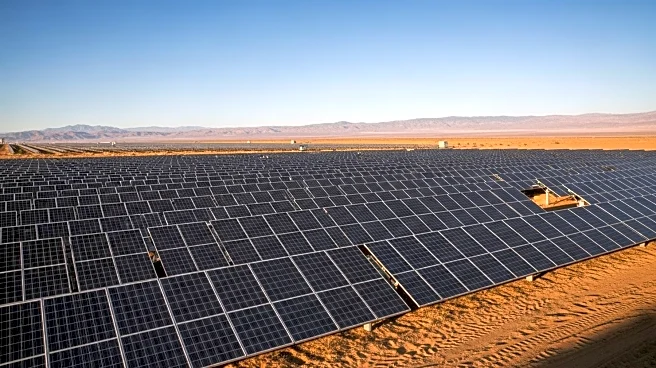What's Happening?
Sibanye-Stillwater, a multinational mining and metals processing group, has announced the commercial operation of the Springbok solar PV project located in South Africa's Free State province. Developed and financed by the SOLA Group, the project has a capacity of 150 MW alternating current and 195 MW peak direct current. Sibanye-Stillwater will procure 75 MW of the plant's capacity for a ten-year period through a power purchase agreement with SOLA Group. This marks the second renewable energy project for Sibanye-Stillwater's South African operations this year, following the Castle wind farm. The Springbok project is expected to save the company over R60-million annually and supply about 4% of its energy needs in South Africa. Additionally, it will reduce carbon dioxide emissions by 229,000 tons per year, contributing to the company's goal of achieving carbon neutrality by 2040.
Why It's Important?
The Springbok solar project is significant as it represents a step towards energy independence and decarbonization for Sibanye-Stillwater. By reducing reliance on state-owned Eskom utility rates, the project offers substantial cost savings and environmental benefits. The reduction in carbon emissions aligns with global efforts to combat climate change and positions Sibanye-Stillwater as a leader in sustainable mining practices. The project also mitigates future carbon tax liabilities, providing financial advantages. As the mining industry faces increasing pressure to adopt greener practices, this development highlights the importance of renewable energy in achieving sustainability goals.
What's Next?
Sibanye-Stillwater plans to continue its journey towards energy independence and decarbonization, with the Springbok solar project being part of a larger portfolio of contracted renewable energy projects. The company aims to achieve carbon neutrality by 2040, and further renewable energy initiatives are expected to follow. The success of the Springbok project may encourage other mining companies to invest in similar projects, potentially leading to broader adoption of renewable energy in the industry.
Beyond the Headlines
The Springbok solar project not only contributes to environmental sustainability but also reflects a shift in corporate responsibility within the mining sector. As companies increasingly prioritize reducing their carbon footprint, the integration of renewable energy sources becomes crucial. This development may influence regulatory policies and encourage governments to support similar initiatives, fostering a more sustainable industrial landscape.








